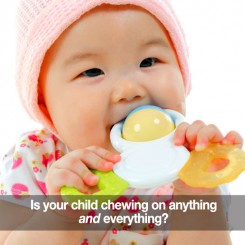
MOST OF OUR PATIENTS ALREADY have quite a few teeth of their own. However, for our very young patients, and for little brothers and sisters of our patients, we thought it might be handy for our readers to know a few basics about teething.
What To Expect When Your Baby Starts Teething
Teething starts anywhere between 4 months old to a year old. The teething process will usually last a few years, with a full set of teeth settling in by age three. You may notice that your baby is teething when you see these signs:
- irritability
- trouble sleeping
- bumps in the gums
- extra drooling
You Can Keep Your Child Comfortable With These Tips
Cutting new teeth can be a very uncomfortable process. Here are some ideas for soothing your teething child:
- Give them teething objects.
- Chilled teething toys are especially handy (refrigerated, not frozen), or even a cool wet cloth.
- Try massaging their gums with a clean finger.
- Avoid benzocaine products (usually in numbing gel) with children under two, unless specifically recommended and supervised by a physician.
Here Are Some More Tips:
Take Good Care Of Your Child’s Brand-New Teeth
Your child’s brand-new teeth are especially vulnerable to decay. Make sure you follow these tips:
- DON’T put your child to bed with a bottle full of milk or juice. This can lead to baby bottle tooth decay, a very serious dental concern.
- Clean the gums and budding teeth with a clean, wet washcloth. Later, use a soft toothbrush.
- Bring your child in for a dental visit by age one. This allows us to establish a safe, cheerful dental home BEFORE there are any problems that need fixing.
Any seasoned parents out there with advice to share? Comment below! And feel free to share this post with someone you know dealing with a teething baby.
